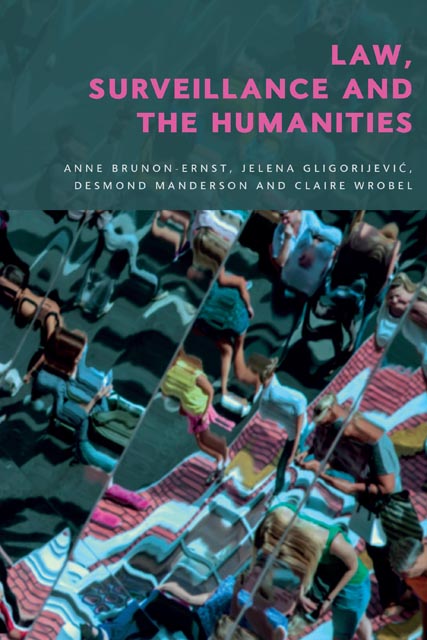1 - Introduction: Watcher, Watching, Watched
Published online by Cambridge University Press: 18 November 2023
Summary
I. Contemporary Surveillance
The con-temporary, Giorgio Agamben argues, is not simply another word for the present. ‘Those who are truly contemporary, who truly belong to their time, are those who neither perfectly coincide with it nor adjust themselves to its demands.’ To see ourselves truly in relation to our own time demands that we look past the repetitive aphasia of our condition. Images of darkness and light pulse through his text and account for its metaphorical richness.
It is a matter of struggling ‘to perceive not its light, but rather its darkness’. And again:
The ones who can call themselves contemporary are only those who do not allow themselves to be blinded by the lights of the century, and so manage to get a glimpse of the shadows in those lights, of their intimate obscurity.
If this is Agamben's metaphor for contemporary critique, it is doubly apt for a collection of essays about the protean forms of contemporary surveillance. For what is surveillance itself but a play of light and shadows? In Michel Foucault's celebrated terms, we have witnessed a shift from a society organised around power as a spotlight designed to ‘render accessible to a multitude of men the inspection of a small number of objects’, to one in which power is a searchlight intended to make visible ‘for a small number, or even for a single individual, the instantaneous view of a great multitude’. The searchlight is exactly that which lights us up, exposes our position, individually and collectively, for the benefit of various interrogators, investigators, invigilators and night watchmen. It is not just that they are hidden in the shadows but that we are ‘blinded’, as Agamben says, ‘by the lights of the century’. The glaring light of our exposure is what makes it so hard to see what's going on around us. We suffer from miosis.
Surveillance is a notoriously elusive concept and many authors opt for safely short definitions such as ‘the systematic monitoring of people or groups in order to regulate or govern their behavior’; ‘the monitoring of human activities for the purposes of anticipating or influencing future events’; or ‘processes in which special note is taken of certain human behaviours that go well beyond idle curiosity’. This collection aspires to something a little more specific.
- Type
- Chapter
- Information
- Law, Surveillance and the Humanities , pp. 1 - 26Publisher: Edinburgh University PressPrint publication year: 2023



